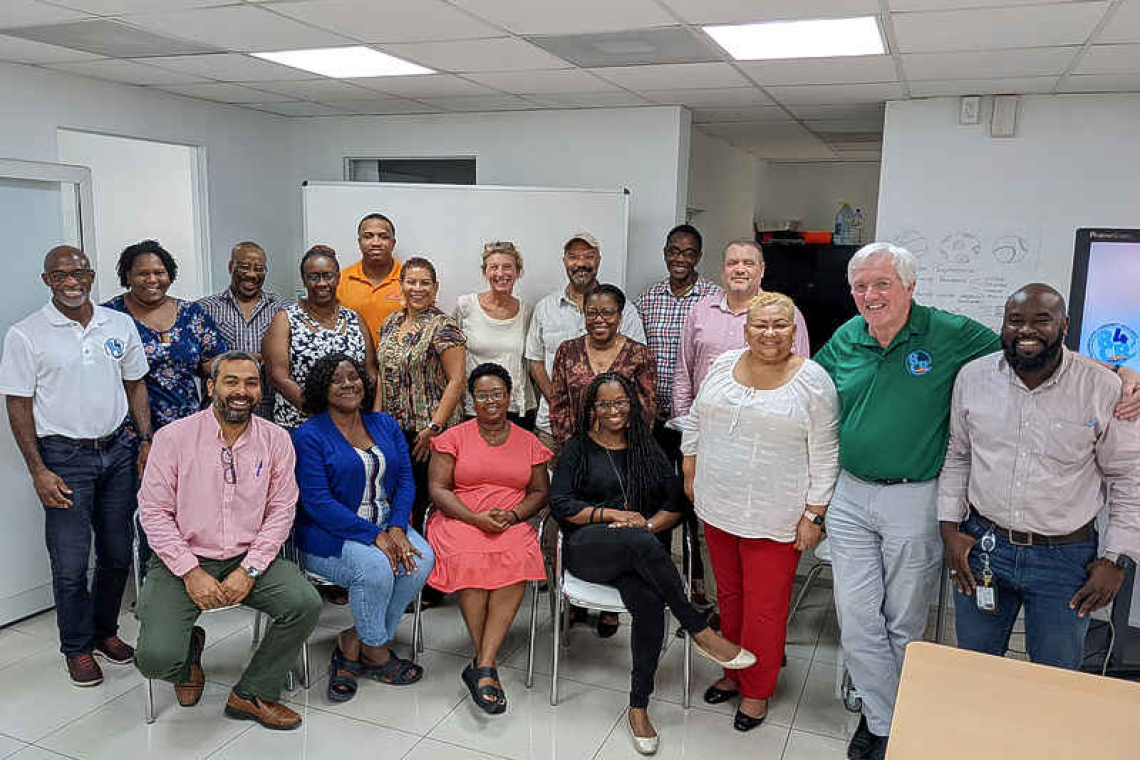Participants of group 1 and presenters of R4CR’s workshops on Governance for Non-Profit Organizations.
PHILIPSBURG--Twenty-seven persons, mostly volunteers, participated in recently-held Resources for Community Resilience R4CR workshops on Governance for Non-Profit Organizations.
“Because of the huge demand for this workshop we were forced to create two groups to be able to accommodate everyone,” stated R4CR Training and Capacity Strengthening Manager Jose Sommers. The workshops were held on November 21 and 23.
The course material for the workshops was developed in-house by Sommers and Rolf Hunink and provided six hours of interactive training on governance for non-profit organisations. The subjects covered important issues, such as: What is (good) governance?; Checks and balances; Board composition; The role of the board; Board member archetypes; Recruiting board members; Staffing; Working with volunteers; Organisational strategy; and Collaboration.
After the official opening and formal introductions, participants were treated to a fictitious case study in which two concerned citizens (Tim and Mary) want to tackle the growing problem of people with debt on the island. Sommers said, “The case stood as a model for how many non-profit organisations start: mostly with one or more socially conscious persons driven to solve a problem they have experienced or identified in the community. Through interactive assignments, exercises and some basic theory the participants discussed the many governance issues that arise when running a non-profit foundation.”
The final subject during the workshops was reserved for collaboration. Although not the first thing that comes to mind when thinking about governance, the R4CR workshop designers found collaboration between the various non-profit organisations on the island an especially important topic, because it allows foundations to share resources (human, operational, financial) and achieve synergies that could make the collaborating organisations much more efficient and stronger.
“We see some organisations collaborating on an operational level, but we think that there is still a large untapped potential in that area. To stimulate collaboration, R4CR allocates a higher maximum budget (US $120,000) for collaborative projects compared to an individual organisation submission ($90,000). To date we have not had any collaborative submissions yet, but we do expect to receive the first one during Round 5 financing, which closes on December 7,” concluded Sommers.
The R4CR programme includes a grant scheme as funding mechanism for community and social rehabilitation initiatives in St. Maarten and focuses on improving the capacity of local non-profit organisations in reconstruction and resilience activities post-Hurricane Irma.
R4CR is financed by the government of the Netherlands via the St. Maarten Trust Fund, which is administered by the World Bank, monitored by the National Recovery Program Bureau (NRPB) and executed by VNGI. Project activities by registered local non-profit organisations can cover subject areas such as neighbourhood initiatives, sports/recreation, nature/environment, culture, poverty relief, day care centres/after-school programmes, youth employment, skills development, psycho-social support/health/well-being and gender-based violence.







